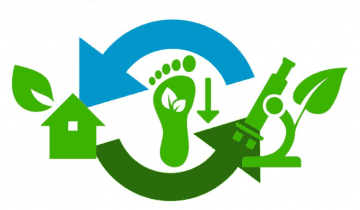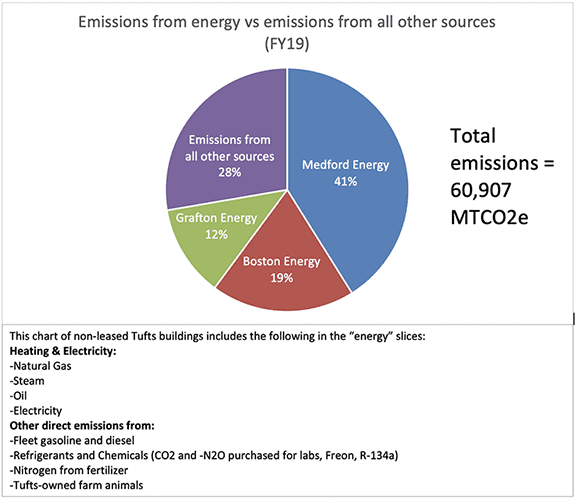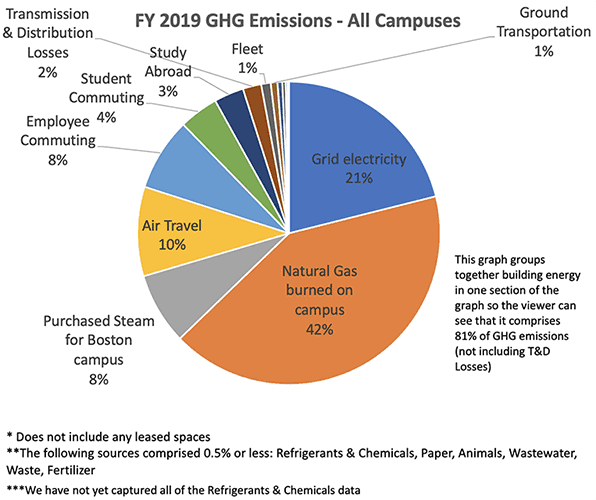Decarbonization at Tufts

What is Decarbonization?
Decarbonization is the process of reducing or eliminating carbon dioxide emissions into the atmosphere. This can be achieved by switching from fossil fuel-based energy sources to low-carbon sources.
The majority of Tufts’ operational greenhouse gas emissions come from heating, cooling, and electricity. Tufts plans to use a combination of electrification and offsets, with the goal of a 90% reduction on campus and the remaining 10% to be offset near-term and reduced over time.
In 2016, President Monaco committed Tufts to achieving carbon neutrality on the Medford/Somerville campus as soon as possible, but no later than 2050. Since then, the Tufts Sustainability Council has expanded this commitment to achieving net-zero carbon emissions on all of Tufts campuses as soon as possible, but no later than 2050. This transformation will be complex and includes technology choices, capital investment decisions, and consideration of operational continuity and community learning.
Evaluation on Decarbonizing the Medford/Somerville Campus
The Medford/Somerville campus infrastructure is responsible for the largest share of Tufts emissions footprint and thus our initiatives have started there.
Transitioning heating, cooling and ventilation systems that run on fossil fuels to renewable, zero-carbon energy sources is a complex transformation that necessitates careful decision making on capital investment, technology, operational continuity, and community learning.

- In fall 2018, Tufts hired the engineering firm Ramboll Group to examine energy use and distribution on the Medford/Somerville campus.
- Ramboll mapped out potential scenarios to decarbonize the energy systems at the M/S campus by 2050.
- Ramboll conducted three community engagement events with students, staff and faculty to gain a wide array of perspectives on their proposals (View events and workshops online).
- A climate action plan was developed to fulfill the requirements of the Second Nature Climate Commitment.
- The following year, Tufts engaged with Ecosystem Energy Services to create a pathway to decarbonize the energy system on the M/S campus. This plan prioritized reducing wasted energy, converting from steam to a hot water heating distribution system, electrifying the heating systems, and switching to alternative fuels for energy production.
- Tufts still needs a long-term solution for the Central Energy Plant (CEP) and will shift to a method that focuses on greenhouse gas reduction, life cycle cost analyses, and energy efficiency for this project.

Scope 1 emissions are direct GHG emissions that occur from sources that are controlled or owned by an organization (e.g., emissions associated with fuel combustion in boilers, furnaces, vehicles).
- Any burning of fossil fuels that happens on campus is a Scope 1 emission, seen in places like the Central Energy Plant that Tufts constructed in 2018 and owns and operates.
Scope 2 emissions are indirect GHG emissions associated with the purchase of electricity, steam, heat, or cooling.
- Tufts purchases energy made off-campus that leads to indirect emissions. For example, some buildings on campus get electricity from the electrical grid outside of Tufts, like CoHo housing.
Scope 3 emissions are the result of activities from assets not owned or controlled by the reporting organization, but that the organization indirectly impacts in its value chain.
- For example, emissions from activities that Tufts indirectly impacts include:
- Air travel for Tufts business (faculty traveling to a conference)
- Study abroad (students traveling internationally)
Next Steps
Tufts’ emissions from scope 2 and scope 3 still need to be addressed. For example, Tufts will need to source renewable electricity to offset the emissions within the New England grid.
Tufts will need to source renewable electricity to offset the emissions within the New England grid. We greatly value the input of community members and welcome comments, questions, and concerns as our campus continues to move in the direction of carbon neutrality. The Tufts Office of Sustainability is looking forward to supporting this crucial work and is excited to help maintain this campus-wide commitment.
For more information, please contact: sustainabilityoffice@tufts.edu.
Data Dashboard
The Operations Division created the energy and water data dashboard below which compiles data across all four Tufts campuses. Play around with the interactive dashboard to discover common greenhouse gas emitters at Tufts and how emissions levels have changed over the years. Scroll to the bottom right hand corner to expand the dashboard.